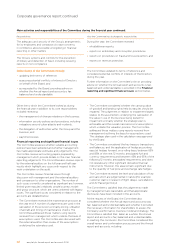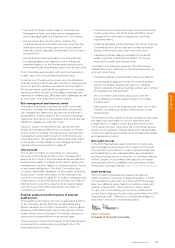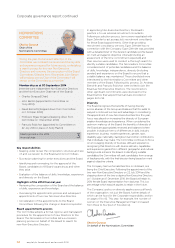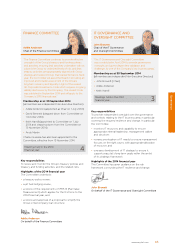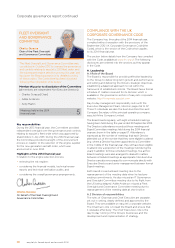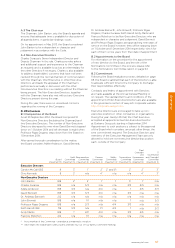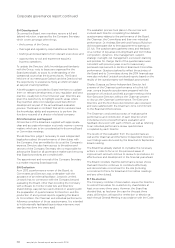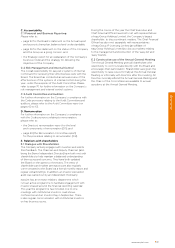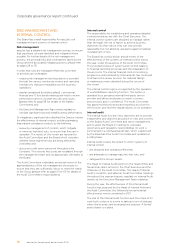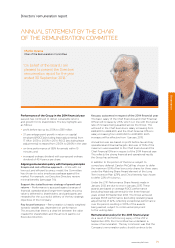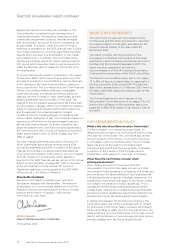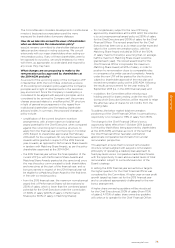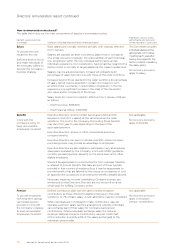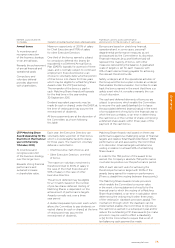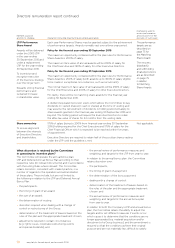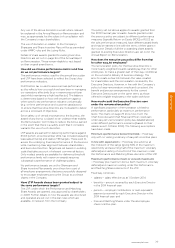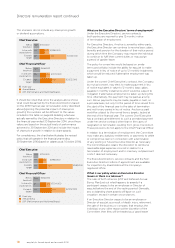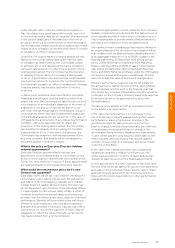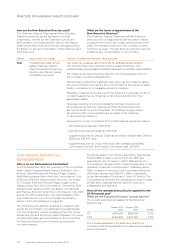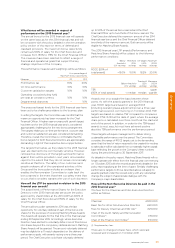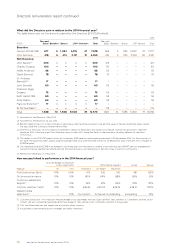EasyJet 2014 Annual Report Download - page 74
Download and view the complete annual report
Please find page 74 of the 2014 EasyJet annual report below. You can navigate through the pages in the report by either clicking on the pages listed below, or by using the keyword search tool below to find specific information within the annual report.
72 easyJet plc Annual report and accounts 2014
Directors’ remuneration report continued
aligned with easyJet’s principles, as noted above. The
Committee also considered recent developments in
institutional investors’ ‘best practice’ expectations and,
in particular, the general consensus that has emerged
that remuneration structures should be simplified as far
as practicable. As a result, under a revised LTIP that is
expected to operate from the 2016 financial year, it is the
Committee’s intention to no longer grant Matching Share
Awards which will result in a simplification of the overall
remuneration policy. In addition, the Committee will be
introducing a holding period for shares vesting under the
LTIP, during which Executive Directors will be required to
retain the after-tax value of shares for 24 months from
the vesting date.
To ensure that easyJet remains competitive in the market
for executive talent, at the same time as adhering to the
principle of operating in a cost effective manner, there are
to be changes to the Chief Financial Officer’s maximum
bonus opportunity. This is in response to the Chief Financial
Officer’s remuneration falling well below comparable
market benchmarks in total pay and follows extensive
dialogue with the Company’s major shareholders and the
leading shareholder advisory bodies on this issue. This
change to his remuneration arrangements will ensure that
his remuneration package will be more market competitive,
subject to delivering the Board’s performance objectives,
and the approach to increasing quantum remains
consistent with the overall philosophy of operating with
below-market fixed levels of pay. The revised annual bonus
opportunity will continue to be earned against rigorous
annual performance targets. To further strengthen the
alignment between the Chief Executive and shareholders,
the Chief Executive will, in future, be required to build and
retain shares equal in value to 200% of salary (up from
175% of salary).
No other changes are being proposed to the policy for
which shareholder approval was received at the 2014
Annual General Meeting (AGM). To implement the above
changes the Company is seeking shareholder approval
for a revised remuneration policy which is set out on pages
72 to 80. Details of how the policy will be applied in
practice for the 2015 financial year are set out in the Annual
Report on Remuneration on pages 80 to 88. A summary
of the principal terms of the revised LTIP, for which
shareholder approval is being sought at the 2015 AGM,
will be set out in the Notice of Meeting.
Shareholder feedback
easyJet is committed to maintaining an open and
transparent dialogue with shareholders. The objective
of this report is to communicate clearly how much the
Executive Directors are earning and how this is strongly
linked to performance. As always, I welcome any
comments you may have.
Charles Gurassa
Chair of the Remuneration Committee
17 November 2014
WHAT IS IN THIS REPORT?
This report sets out easyJet’s remuneration policy
for Executive and Non-Executive Directors, describes
the implementation of that policy and discloses the
amounts earned relating to the year ended 30
September 2014.
The report complies with the provisions of the
Companies Act 2006 and Schedule 8 of The Large
and Medium-sized Companies and Groups (Accounts
and Reports) (Amendment) Regulations 2013. The
report has been prepared in line with the
recommendations of the UK Corporate Governance
Code and the requirements of the UKLA Listing Rules.
The Directors’ remuneration policy (set out on pages
72 to 80) will be put to shareholders for approval in a
binding vote at the forthcoming AGM. The effective
date of the updated policy is 12 February 2015, which is
the date shareholder approval is being sought for the
revised policy.
The Annual Statement by the Chairman of the
Remuneration Committee (set out on pages 71 to 72)
and the Annual Report on Remuneration (set out on
pages 80 to 88) will be subject to an advisory vote at
the AGM.
OUR REMUNERATION POLICY
What is the role of our Remuneration Committee?
The Remuneration Committee has responsibility for
determining remuneration for the Executive Directors and
the Chairman of the Board. The Committee also reviews
the remuneration of the Group’s most senior executives
in consultation with the Chief Executive. The Committee
takes into account the need to recruit and retain
executives and ensure that they are properly motivated
to perform in the interests of the Company and its
shareholders, while paying no more than is necessary.
What does the Committee consider when
setting remuneration?
When setting the policy for Executive Directors’
remuneration, the Committee takes into account total
remuneration levels operating in companies of a similar size
and complexity, the responsibilities of each individual role,
individual performance and an individual’s experience. Our
overall policy, having had due regard to the factors noted,
is to weight remuneration towards variable pay. This is
typically achieved through setting base pay at market
median levels, offering very modest pension and benefits,
and above-market variable pay opportunities linked to the
achievement of very demanding performance targets.
In setting remuneration for the Executive Directors, the
Committee takes note of the overall approach to reward
for employees in the Group. Salary increases will ordinarily
be (in percentage of salary terms) in line with those of the
wider workforce. The Committee does not formally consult
directly with employees on executive pay but does receive
periodic updates from the Group People Director.


